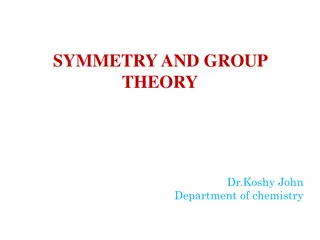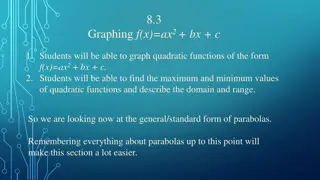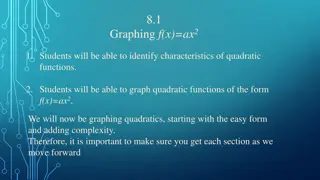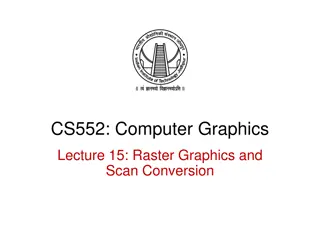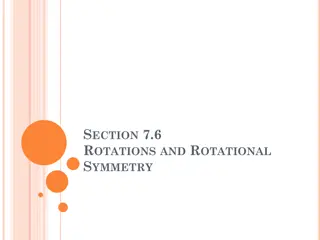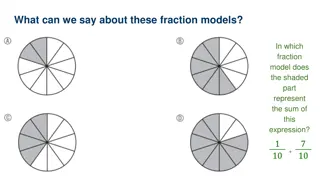Insights into Symmetry and Magnetism in Summer School Curriculum
Delve into the principles and applications of symmetry in magnetism through topics like tensor transformations, Edelstein effect, and breaking inversion symmetry in magnetic materials. Explore the role of crystal structures and interfaces in breaking symmetry, especially in antiferromagnets, providi
2 views • 39 slides
Principles and Applications of Symmetry in Magnetism Summer School Lecture
This lecture delves into the principles and applications of symmetry in magnetism, covering topics such as the symmetry of response tensors, transformations of tensors, time-reversal symmetry, and beyond point groups. It explores the symmetry of local effects, equivalent magnetic configurations, exp
2 views • 14 slides
The World of Triangles
Dive into the realm of triangles, from basic properties like sides and angles to the classification into acute, obtuse, right, scalene, isosceles, equilateral, and equiangular triangles. Discover concepts like congruence, the Pythagorean theorem, and the significance of the hypotenuse in right trian
0 views • 26 slides
Understanding Consumer Demand Principles and Elasticity Theories
Explore the theory of consumer demand, including the principles of price-demand relationship, homogeneity, symmetry, and price elasticity. Delve into the concepts of own-price elasticity, cross-price elasticity, and expenditure elasticity to understand how changes in prices and income affect consume
1 views • 8 slides
Understanding Symmetry and Group Theory in Chemistry
Exploring the world of symmetry elements in molecules, encompassing identity, proper axis of symmetry, centre of symmetry, and plane of symmetry. Learn how these elements help in identifying the symmetry of molecules quantitatively, with examples like N2F2, H2O, C2H4, NH3, and Dichlorobenzene.
1 views • 12 slides
Fun Symmetrical Figures Activities for Learning and Creativity
Engage in a series of interactive activities involving color, symmetry, and reflection with symmetrical figures. From coloring squares to completing shapes along the line of symmetry, explore the properties of shapes while enhancing creativity and problem-solving skills.
0 views • 18 slides
Understanding Symmetry in Shapes: A Visual Exploration
Delve into the world of symmetry with explanations and visual examples of line symmetry in shapes like squares, kites, and parallelograms. Explore the concept of rotational symmetry and try your hand at completing shapes based on given lines of symmetry. Discover the special properties of the letter
1 views • 23 slides
Understanding Relations and Functions in Mathematics
This chapter explores various types of relations and functions, including empty and universal relations, equivalence relations, and common errors in understanding symmetry. It also delves into the concept of reflexivity, symmetry, and transitivity in relations, with practical examples provided for b
1 views • 16 slides
Geometry Learning - Lines of Symmetry Activities
Explore various activities focused on lines of symmetry in shapes. Engage in identifying symmetrical shapes, finding lines of symmetry through folding, sorting shapes based on symmetrical properties, drawing lines of symmetry, and reasoning about symmetrical shapes. Enhance your understanding of sym
0 views • 16 slides
Understanding Quadratic Functions: Graphing and Analysis
This content covers graphing quadratic functions in the form f(x)=ax^2+bx+c, focusing on finding maximum and minimum values, domain, and range. Key concepts include determining the direction of the parabola, identifying the y-intercept and axis of symmetry, finding the vertex, and plotting points to
0 views • 10 slides
Understanding Symmetry in Structures and Aesthetics
Exploring the concept of symmetry and its impact on form, function, and aesthetics in structures. Symmetry plays a crucial role in identifying and appreciating the beauty of objects, with examples ranging from nature to architectural marvels like the Taj Mahal and Hundertwasser's unconventional desi
0 views • 15 slides
Understanding Quadratic Functions: Graphing and Characteristics
This lesson focuses on graphing quadratic functions of the form f(x) = ax^2, where students will learn to identify key characteristics such as the vertex, axis of symmetry, and behavior of the graph. By analyzing graphs, they can determine domain, range, and whether the function is increasing or dec
0 views • 8 slides
Understanding the C2h Point Group: Character Table, Characteristics, and Subgroups
Characteristics of the C2h point group, including its order and irreducible representations, as well as details on its symmetry elements and subgroups. Examples of molecules with C2h symmetry are provided. Explore the construction and properties of the C2h point group in crystallography.
0 views • 10 slides
Understanding Real Analysis: Definitions and Examples in Metric Spaces
Presented by Dr. U. Karuppiah, this informative content delves into the fundamental concepts of metric spaces in real analysis. It covers definitions such as the metric space, symmetry, interior points, and open sets, along with examples illustrating these concepts. The content explores the properti
2 views • 21 slides
Exploring Symmetry in the Alphabet: Rotation and Reflection Symmetries
Discover how rotation and reflection symmetries play a role in the alphabet, with most letters exhibiting some type of symmetry. Explore rotational symmetries both in and perpendicular to the plane, as well as symmetries across horizontal and vertical axes. Learn about the concepts of rotational sym
0 views • 13 slides
Exploring the Fascination with Symmetry in Art and Nature
Delve into the captivating world of symmetry and its appeal to humans. Symmetry, whether reflectional or rotational, resonates with our aesthetic sense by showcasing balance, repetition, and identical patterns. Through images and definitions, uncover the beauty and significance of symmetry in variou
0 views • 27 slides
Exploring Quadrilaterals and Symmetry Concepts
Delve into the world of quadrilaterals by identifying their properties, understanding rotational symmetry, and tackling questions on angles and shapes. Engage in activities to enhance your knowledge and skills in geometry.
0 views • 28 slides
Understanding Electron Paramagnetic Resonance (EPR) and Molecular Symmetry
The discussion covers the relevance and applications of EPR spectroscopy in studying electron behavior, spin-orbit coupling effects, and molecular symmetry. Key concepts include anisotropy, nuclear spin coupling, and deviations in electron g-factors. It delves into how these factors impact the obser
0 views • 11 slides
Understanding Jeans Equations in Stellar Dynamics
The Jeans Equations and Collisionless Boltzmann Equation play a crucial role in describing the distribution of stars in a gravitational potential. By applying assumptions like axial symmetry and spherical symmetry, these equations provide insights into the behavior of large systems of stars. Despite
0 views • 7 slides
Graphing Polar Equations: Examples and Symmetry Tests
Explore examples of graphing polar equations like r = 3, r = 4sin(θ), and more. Learn how to identify and graph such equations, along with tests for symmetry in polar graphs. Understand the relationship between polar axis, lines, and the pole in polar coordinate systems.
0 views • 15 slides
Understanding Matrix Operations and Properties
Dive into the world of matrices with this comprehensive guide covering unary operations, matrix transposition, symmetry, trace calculation, and determinant computation. Explore examples and definitions to grasp these fundamental concepts in linear algebra effectively.
0 views • 42 slides
Exploring Nuclear Symmetry Energy with QCD Sum Rule
This study delves into the concept of nuclear symmetry energy through the lens of QCD Sum Rule, discussing its implications in Rare Isotope Accelerator Plan and nucleon-nucleus scattering. Utilizing mean field approximation and Borel transformation, the research aims to understand asymmetric nuclear
0 views • 21 slides
Nuclear Symmetry Energy in QCD Degree of Freedom
Understanding the nuclear symmetry energy in the context of Quantum Chromodynamics (QCD) is essential for nuclear phenomenology. This study explores topics such as QCD sum rules, mean field approximation, and operator product expansion to decipher the energy properties of nuclear systems. The resear
0 views • 15 slides
Understanding Data Mining Similarity and Distance Concepts
Data mining involves quantifying the closeness of objects through similarity and distance measures. These measures are crucial for various tasks like recommending similar items, grouping customers, and detecting duplicates in web documents. Similarity metrics ensure objects are ranked correctly base
0 views • 65 slides
Understanding the Standard Model of Physics
Delve into the world of quantum field theory, gauge symmetry, Higgs mechanism, electroweak theory, and more with this detailed overview of the Standard Model. Explore classical mechanics, Noether's theorem, relativistic mechanics, quantum mechanics, and quantum field theory concepts. Discover how th
1 views • 21 slides
Lewis Dot Structures and Polarity Review
Learn about Lewis dot structures, how to draw them, determine polarity, and practice drawing various compounds. Understand the concepts of valence electrons, central atoms, bonding, and lone pairs in molecules. Discover the distinction between polar and nonpolar structures based on symmetry.
0 views • 10 slides
Understanding Graph Theory for Image Processing
Exploring the concepts of fitting, grouping, and affinity measurement in image processing through examples of weighted graph computations and clustering algorithms. Discover how images are represented as graphs and the significance of symmetry in affinity matrices.
0 views • 58 slides
Crystal Geometry Systems and Symmetry Elements
Crystal geometry involves the study of seven crystal systems defined by three symmetry elements - centre of symmetry, planes of symmetry, and axes of symmetry. These symmetry elements play crucial roles in determining the geometric properties of crystals. The centre of symmetry, plane of symmetry, a
0 views • 12 slides
Raster Graphics and Scan Conversion in Computer Graphics
This lecture covers various topics related to raster graphics and scan conversion in computer graphics. It includes issues with scan converting a line, generalized line drawing algorithms, and the midpoint circle drawing algorithm. Additionally, it explores deriving mathematical expressions for draw
0 views • 21 slides
Influence of Fermionic Exchange Symmetry Beyond Pauli's Exclusion Principle
Christian Schilling from the University of Oxford delves into quantifying the impact of fermionic exchange symmetry, going beyond Pauli's exclusion principle. The study explores generalized Pauli constraints, concrete systems analysis, and the relevance of (quasi) pinning. Collaborating with various
0 views • 27 slides
Deciphering Heavy Atom Coordinates from Difference Patterson Map: An Overview
Understanding how to determine heavy atom coordinates from a difference Patterson map involves recognizing the relationship between Patterson peak coordinates (u,v,w) and space group symmetry operators in crystallography. By solving equations that relate these coordinates, the absolute positions of
0 views • 5 slides
Exploring Rotations and Rotational Symmetry in Geometry
Delve into the concepts of rotations, rotational symmetry, and the Windmill Method in geometry. Learn about different types of rotations, how to rotate points around the origin, practice rotations with given points, and understand rotational symmetry in objects. Discover the principles of rotating o
0 views • 9 slides
Math Quiz Questions and Answers
Challenge yourself with these math quiz questions covering topics like vertex and axis of symmetry, x and y intercepts, function graphs, and more. Test your understanding of parabolas and equations while learning key concepts along the way through detailed explanations and visual aids.
0 views • 51 slides
Trigonometry Concepts: Graphs, Symmetry, and Laws Explained
Explore trigonometry concepts such as sine, cosine, and tangent graphs, symmetry in trigonometric functions, and laws of trigonometric functions. Understand how to determine values using symmetry and graph analysis. Practice identifying values in the range 0 to 360 for sine, cosine, and tangent func
0 views • 22 slides
Exploring Topological Band Theory and Quantum Phases in Electronic Matter
Delve into the fascinating realm of topological band theory, examining the insulating state, band topology in different dimensions, symmetry-protected topological band insulators, and the interplay between symmetry and topology. Uncover the principles underlying matter symmetry, quantum phases, and
0 views • 29 slides
Impact of Symmetry and Eye Color on Perceived Attractiveness in Female College Students
This research explores the effects of facial symmetry and eye color on perceived attractiveness and mate quality in female college students. The study investigates whether symmetrical faces and certain eye colors enhance attractiveness and mate selection. Factors such as bilateral symmetry, fluctuat
0 views • 13 slides
Math Concepts Overview: Fractions, Age Differences, Prime Numbers, Area & Geometry
Explore various math concepts including fraction models, age differences, prime numbers, area calculations, symmetry in shapes, line plots, and number patterns in this collection of educational images and questions.
0 views • 18 slides
Sketching Graphs of Functions: Techniques and Examples
The art of sketching graphs of functions involves representing specific shapes and behaviors through labeled diagrams. This lesson highlights key details to keep in mind when sketching functions, such as labeling axes, maximum and minimum values, intercepts, symmetry, and asymptotes. Two examples of
0 views • 16 slides
Understanding Conservation Laws: Charge Conjugation, Parity Symmetry, and Violation
In this comprehensive guide, we delve into the intricate concepts of charge conjugation symmetry, G-parity, and the conservation and violation of parity symmetry in fundamental physics. Explore how these principles apply to strong, electromagnetic, and weak interactions through detailed explanations
0 views • 14 slides
Structural Parameters and Symmetry Operations of Organic Compounds
This document presents detailed structural parameters of various organic compounds along with their space groups, crystal systems, and symmetry operations including rotary inversion, screw axis, and glide plane. The data includes molecular formulas, molecular weights, unit cell dimensions, and refle
0 views • 7 slides




